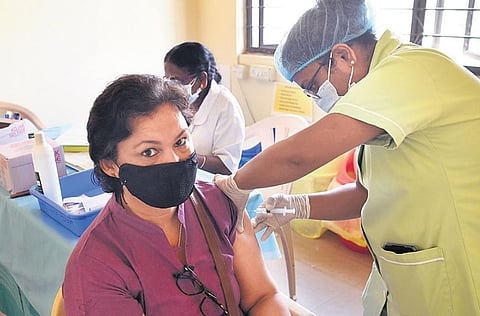

BENGALURU : As you read this column, I assume you’ve taken at least one dose of the vaccine. For most of us, the vaccination process was fairly simple. One has to register their phone number on the Cowin website, then select a slot and vaccine of choice. All one needed then was to turn up at the vaccination center with proof of identity. When I got my first jab, I remember thinking how smooth this process was, how this would have been a nightmare in other times. But reality is often stranger than fiction. Out of curiosity, I Googled vaccine penetration in the country, and the results are shocking. Only about 3 percent of India has been fully vaccinated, and only about 20 percent have gotten a minimum of one vaccine.
It was then that my privilege hit me like the stench from an overflowing, urban lake. What seemed a breezy process for me was a technological barrier to most Indians. Of course, this isn’t the first time the government has garnered the power of technology to solve an issue. Decades ago, my board exam results were to be declared on the internet. Since my parents knew nothing about computers or the internet, I’d lied that I needed to surf the web every day to check for the results.
This was when I dipped my toes in the murky waters of pornography. By the time the results came out, I honestly couldn’t care less about my marks; so transfixed was I by badly photoshopped images on the web. And then there was the legendary IRCTC website. Children of today will not truly appreciate the adventure of booking a train ticket a decade ago.
The IRCTC website was created by the gods to test human patience. Without modern apps and sites, IRCTC was the only platform to get on the railway platform. But the site was so slow that technology often upgraded from 2G to 3G before your ticket was booked. The government would announce new trains on your route before your ticket was booked. Time would pass, and new children would be born in families before the tickets were booked. But one didn’t dare refresh the page for fear of the site crashing. For by the time the page reloaded, you were a different person with a different worldview. For those who went through the dark ages of IRCTC, the Cowin app is a laughable barrier. But when I asked the people around me, I found that most people found the process too complicated. Our maid hadn’t registered on the site, neither did the genial Darjeeling man who sells momos near my house. Most of them are first-time internet users, and do not have access to a computer or laptop.
Their mobile phones are usually used for work, and pausing to do something xelse on the phone could result in a loss of work or sales. I usually end my column with a joke, a callback, or a completely made-up quote. But I have no such thing to offer this week. If you know someone who isn’t as fluent with technology around you, try to get them registered on the Cowin site. Ironically, India has for decades been running the most efficient immunisation programme in the world. Millions of Indian children have been administered the polio drops for years, in a system that had no dependence on technology. But since the entry barrier for vaccinations is technological, it would be a nice thing to do - especially while living in a city that’s famed for its information technology revolution.
(The author’s views are his own)